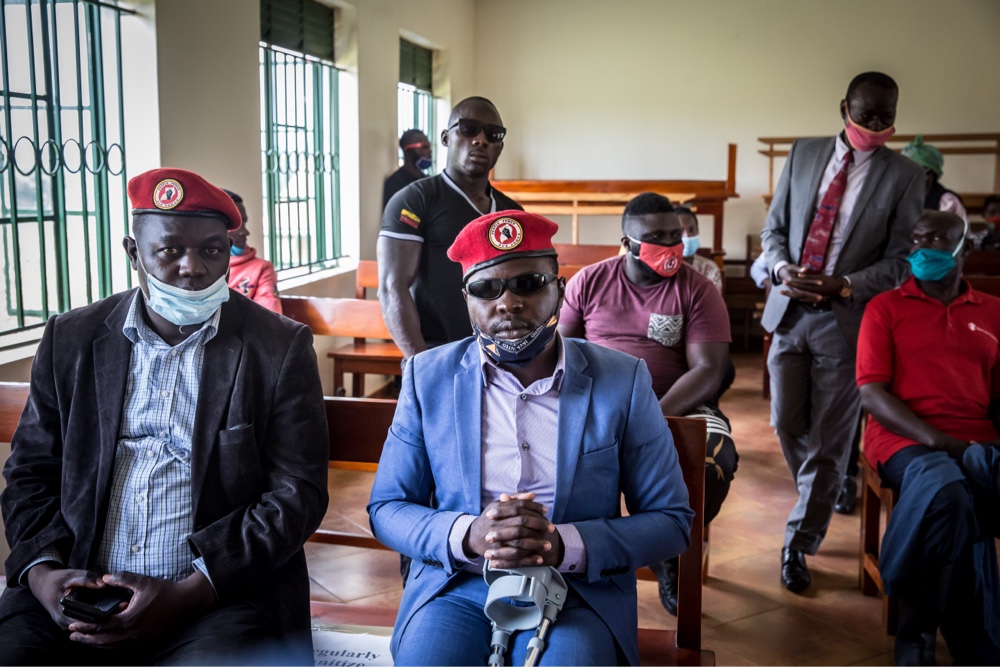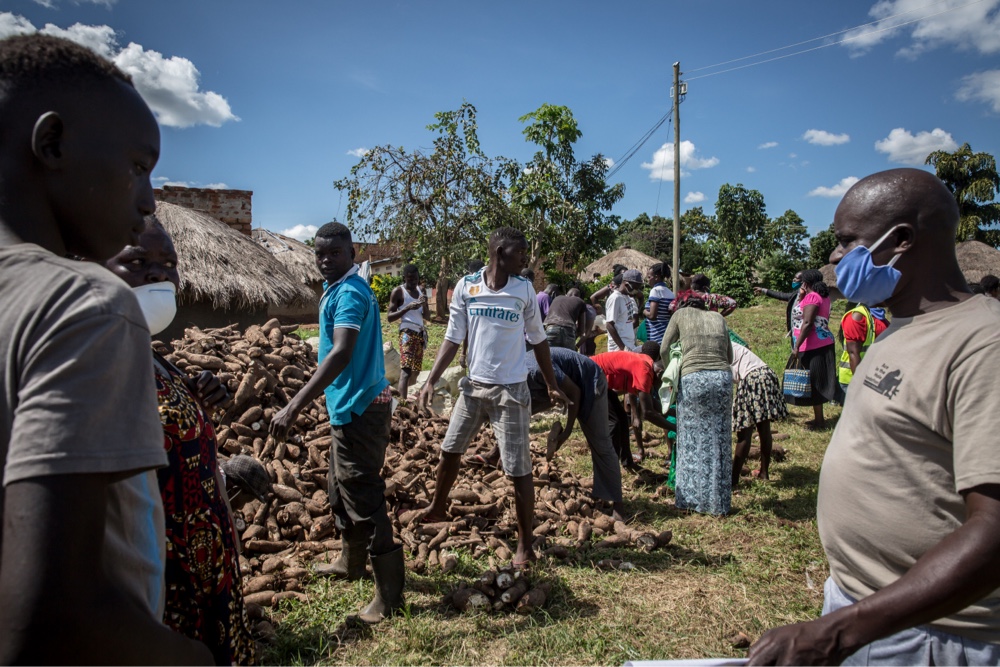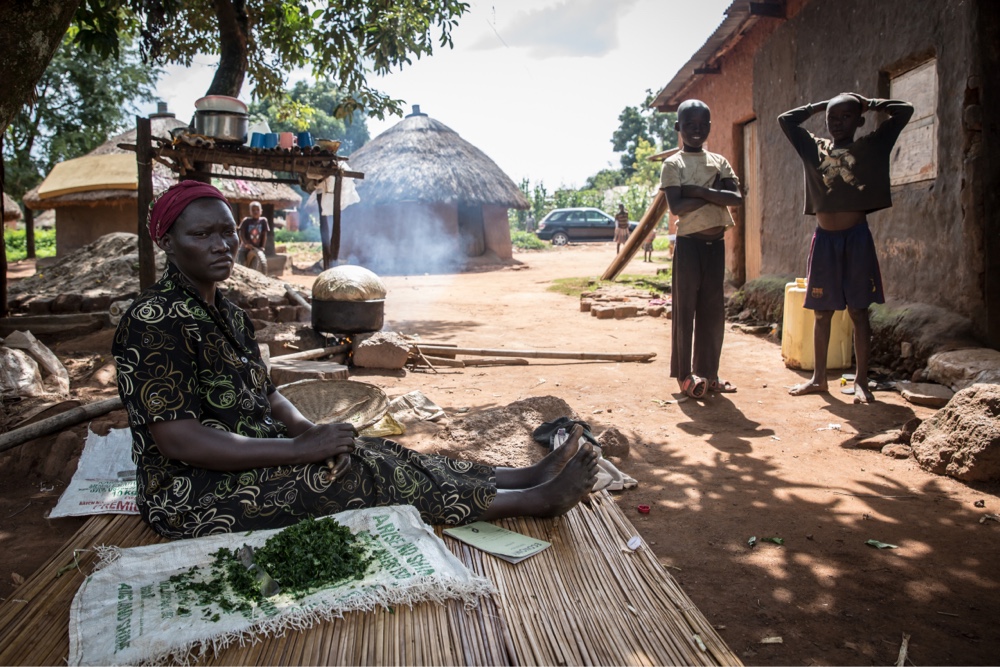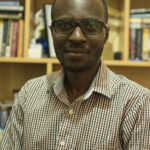This story is being co-published with 100Reporters.
When government leaders across Africa began to impose lockdowns to curtail the spread of the coronavirus last year, many Africans, who were not covered by any form of social protection, began to panic.
In Gulu, northern Uganda, 35-year-old Amina Yot, a widow, lost the odd jobs she relied on to feed her family. She coped by encouraging her five children to drink water to make their stomachs feel full. “Since corona started, life is really very hard,” she said.
Isaac Raechekhu, a father of four who lives in the South African township of Alexandra, said his family went without any government support during the lockdowns. “Some received, while some of us didn’t get anything,” said Raechekhu.
In Lagos, Nigeria, emergency assistance announced by the government never reached the majority of the city’s estimated 20 million residents, about 60 percent of whom live in poverty.
Samuel Gbaruko, who runs a small barbershop in the Yaba district of Lagos, said he struggled to survive during the lockdowns.
“Sometimes it was just one meal per day and nothing more,” said Gbaruko, who is 25. “It was very, very hard for me.”
While social assistance programs in wealthier countries have helped poor and vulnerable people weather the shocks caused by the pandemic, across the African continent, the absence of government programs left a large share of the population to its own resources. Fewer than 18 percent of Africa’s people are covered by at least one form of social protection, compared to 84.1 percent in Europe and Central Asia.
 Opposition politician Francis Zaake attends a court hearing in Mityana, Uganda, after he was arrested and tortured for distributing food during the COVID-19 lockdown. Photo by Sally Hayden.
Opposition politician Francis Zaake attends a court hearing in Mityana, Uganda, after he was arrested and tortured for distributing food during the COVID-19 lockdown. Photo by Sally Hayden.
A mix of high unemployment, poverty and corruption exacerbated the suffering of vulnerable populations during lockdowns across Africa. From playing politics with the delivery of food staples in Uganda to corruption in distributing relief packages in Nigeria and South Africa, the limited supply of aid was tainted by diversion of relief supplies, theft of food parcels, and — ahead of presidential elections in Uganda — politically-motivated arrests of those who dared to give food packages to families. Citizens were left to grapple with starvation largely on their own, further eroding their trust in government.
Several nations rushed to create emergency relief packages to mitigate the impact of lockdowns on citizens, but these measures were temporary and fell short in countries where social safety nets are nonexistent or severely limited in coverage and reach. Yot said her family had received just 12 pounds (5 kg.) of maize flour from the government between March and September 2020. It was enough for just three or four days, she said.
The pandemic “highlighted the importance of social welfare, but also the inadequacy of the systems in place,” said Ruth Castel-Branco, a researcher at the Southern Centre for Inequality Studies in the University of the Witwatersrand, Johannesburg.
Pre-pandemic austerity measures, combined with weak administrative structures, slowed the expansion of social safety nets to reach the majority of the people affected by confinement measures, she said.
“What really mattered in that first month and a half were the actions of everyday people,” she said. Even in countries with established social welfare systems like South Africa, which quickly moved to introduce emergency cash transfers, “the process of implementation was stilted, it was not smooth by any means [and] it was insufficient,” she added.
Gbaruku, of Nigeria, said that when food packages arrived in his area of Yaba, a suburb of Lagos, they were mainly shared among older people. “They gave older people one loaf of bread, rice, beans and cooking oil and it was shared in such a way that only one older person per household received something, regardless of whether there are two older people in there,” he complained.
 Locals attend a private food distribution in Gulu, northern Uganda. Many people quickly started to starve after lockdowns were imposed. Photo by Sally Hayden.
Locals attend a private food distribution in Gulu, northern Uganda. Many people quickly started to starve after lockdowns were imposed. Photo by Sally Hayden.
In Kenya’s capital of Nairobi, 60-year-old Alice Opisa, who hawked cooked beans before the pandemic, said her family sometimes went to bed hungry or begged neighbours for food during the lockdowns.
“I heard them announcing on the radio, [I] went to register but I have not received that support,” lamented Opisa, who lives in the Dandora slum.
In Uganda, the distribution of aid quickly took on a political dimension as the January 2021 presidential elections approached. While government deliveries of food aid lagged, President Yoweri Mouseveni outlawed food distribution by opposition politicians or sympathetic citizens. Those who went ahead and distributed food were arrested and charged with attempted murder. The government had argued that unauthorized distributions risked drawing crowds, and spreading the virus. Critics, however, decried the measures as a bid by Mouseveni to dominate the pre-election landscape and shut down political rivals.
Among those arrested for providing emegency food was Francis Zaake, a 29-year-old opposition politician. Zaake was arrested in mid-April 2020 in his constituency of Mityana, 50 miles (70km) west of Kampala.
Zaake said he organized over 220 pounds (100kg) of packages after his constituents pleaded for help. He had planned to follow government directives on social distancing and give the foodstuffs to messengers on motorbikes, who could deliver them door to door. He planned to provide food packages to twenty needy families each day.
The problem started the first day, he said, when he posted pictures of 12-pound (5-kg.) food packages on social media platforms, where state authorities picked up the information and came to arrest him without a warrant.
“They [police] just forced themselves into the compound,” Zaake said. “They handcuffed me…they put me under the van, stepped on me, and did all kinds of rough things… beating me.”
Zaake was held in detention for ten days. He faced repeated torture, with guards telling him to either quit politics or join the ruling National Resistance Movement party, he said. He was denied visitors, including a lawyer, and denied medication he needed, he said.
Afterwards, Human Rights Watch and the European Union delegation in Uganda both condemned his treatment.
“Police brutality is always prohibited, pandemic or no pandemic,” said Oryem Nyeko, Uganda researcher at Human Rights Watch, “Uganda’s authorities should urgently look into these allegations and hold those responsible to account.”
 Widow Amina Yot, 35, encouraged her children to drink water to fill their stomachs during the COVID-19 lockdown in Uganda. Photo by Sally Hayden.
Widow Amina Yot, 35, encouraged her children to drink water to fill their stomachs during the COVID-19 lockdown in Uganda. Photo by Sally Hayden.
During an interview at his home in Mityana last August, Zaake said he continued to suffer from the injuries police inflicted on him in detention. His eyes, he said, still hurt from an unknown substance that police sprayed in them. They refused to let him see a doctor afterwards, he said.
“There have been so many people who have been arrested in the country under the same charge, but I can assure you that no court has heard the cases,” said Zaake, suggesting that there were no legal grounds for prosecution. “Even my own case was withdrawn.”
He said his constituents were still struggling because the government hadn’t delivered the emergency aid it promised. In November 2020, a $10 million US-funded cash transfer program created to assist some 120,000 vulnerable Ugandans across six cities was terminated, due to unexplained delays by the Ugandan government.
The US, Uganda’s largest donor of development and humanitarian assistance, said it was “deeply disappointed” and “mindful that ordinary Ugandans continue to suffer from the socio-economic impacts of the COVID-19 pandemic”.
Zaake has since submitted a complaint to the International Criminal Court, accusing the Ugandan government of crimes against humanity. His complaint lists other attacks against him, fellow opposition leaders and supporters, and civilian protesters.
Beyond election-season gamesmanship, corruption also stymied relief efforts.
In Uganda, top officials are facing prosecution for throwing contracts to companies that overcharged for emergency food supplies, while those who received the aid said it was poor quality and would only last a few days for a large family. The corruption allegedly cost the government around 2 billion Ugandan shillings ($544,200).
In South Africa, too, government officials have been accused of corruption and diverting food parcels. In some communities, destitute residents were asked to pay R5 ($0.31) in order to receive food supplies.
Kavisha Pillay, head of stakeholder relations and campaigns at Corruption Watch, a local anti-corruption NGO, said that the theft of food parcels was a problem from the start. Pillay’s organization tapped radio programs and community media, and created a system for people to report diversion of supplies.
Pillay said Corruption Watch passes along these reports to law enforcement agencies, government departments and the auditors general offices for prosecution. Last July, South African President Cyril Ramaphosa signed a proclamation that would allow the Special Investigating Unit [SIU] to probe COVID-19-related corruption.
Similar concerns about diversion of relief packages are common in Nigeria.
In the Lugbe suburb of Nigeria’s capital Abuja, a tailor and a barber said food distribution in their area in April 2020 resulted in bedlam. They spoke on condition of anonymity, saying they feared repercussions for speaking up.
“The government officials came with a truck and a Hilux van full of noodles, rice, garri and eggs and when they came people queued up neatly, with men on one side and women on the other side,” the tailor said.
“But the officials started saying most of us in the queue don’t look poor and people got angry and there was total chaos.”
The barber said the situation got worse when the officials began to share the food items based on “your tribe” and “your religion,” referring to ethnic origin. “They were picking out people from the queue and segregating based on religion and it spoiled everything,” the barber said. Ultimately, most of the food packages were destroyed by angry youths and the government officials had to flee for their safety, he said.
In the northwestern Nigerian state of Kaduna, where state authorities announced a N500 million ($1.3 million) COVID-19 relief package in April 2020, Mahmood Haruna, a local anti-corruption campaigner, said members of civil society organizations were denied access to monitor distribution of food packages in Unguwar Shanu district in the city.
“NGO leave me, NGO leave,” Haruna said the chairman of the committee told him when he insisted that they must monitor the distribution of the food packages, known as “palliatives,” in the region. Haruna said some people whose names were not on the list received food packages.
“The people sharing the palliatives, if you know them, even without you having your name in the list, you’ll get the palliative, but it’s very small, it’s very small,” he added.
Zuwaira Aliyu, an elderly woman who lives with her adult grandchildren in Unguwar Shanu district, said she didn’t receive any food packages even when she heard the committee was distributing aid nearby.
“Look at me,” she said, sitting in front of a small shop where she sells pottery, “an old woman like me, sitting here without a job and doing nothing. Am I not supposed to get something from this government?
“I saw them passing with the food items but none came here to give me anything. I was told they will bring some for me, but nothing came to my door. It is only Allah that helped us to survive.”
Another Unguwar Shanu resident, Saidu Abdullahi, a 74-year-old father of three who lost one of his hands to an accident two decades ago, believed that given his disability, he should have received the food package.
“Honestly, I didn’t get anything,” Abdullahi said. “They were sharing food but I didn’t know who to talk to to include my name. Everything was done in hiding, only a few people received the food packages. You need to know somebody to receive the food.”
Abdullahi’s family survived the lockdowns by begging neighbors for help. “I just go to any home and cry for help and they will take pity on me and help in any way they can,” he said. “Generally, people were afraid of hunger, not the coronavirus, honestly.”
At times, his family went to bed hungry during the lockdown. “It happened,” he said, “not once, not twice, but you don’t tell anybody because it was a tough period.”
Castel-Branco, at the Southern Center for Inequality Studies, stressed that governments need to see social safety nets as a cluster of social and economic policies, especially during crises.
“Cash transfers are a way not only of reducing poverty and inequality, particularly in these moments of crisis, [but]of injecting money into the economy, and increasing aggregate demand,” she said. “That that has to be part of the vision of the state.”
In the absence of sufficient government help, some citizens have stepped up to fill the gap during lockdowns.
Within weeks of the start of lockdown, Moses Omondi, a community organizer in Kibera slum in Nairobi, launched the Adopt-a-Family initiative which connects families in Kibera with well-placed individuals to provide food packages containing sugar, cooking oil, and cereals.
“Our main message to well-wishers was that with 1,500 shillings ($15) you can feed a family for a week,” said Omondi.
The initiative was well received and managed to provide food for 3,800 families, he said recently.
Sponsors could transfer 1,500 shillings directly to a family via mobile transfer or buy food packages or provide vouchers to enable them purchase goods from supermarkets. The initiative also provided a grant of 3000 to 5000 shillings ($30-$50) to 30 families, half of them headed by teachers from private informal schools, to start businesses.
Africa’s Hidden Victims was produced in collaboration with 100Reporters, a US-based nonprofit investigative news organization, and is being co-published with 100Reporters and Africa.com.






